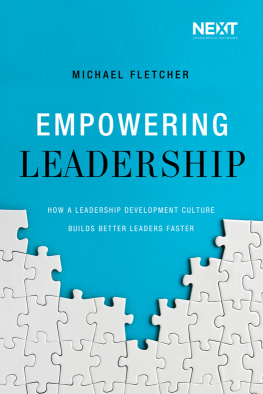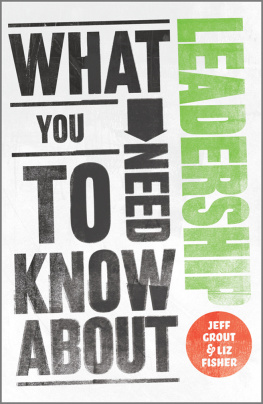
Copyright
Copyright 1995, 2018 by Kim H. Krisco
All rights reserved.
Bibliographical Note
This Ixia Press edition, first published in 2018, is an updated and revised republication of the work originally published by Miles River Press, Alexandria, Virginia, in 1995.
International Standard Book Number
ISBN-13: 978-0-486-82445-1
ISBN-10: 0-486-82445-4
IXIA PRESS
An imprint of Dover Publications, Inc.
Manufactured in the United States by LSC Communications
82445401 2018
www.doverpublications.com/ixiapress
Dedication
To you, and all those who care enough to develop their leadership skills. Its one great way to love the people within your enterprise. And, to the day when you and others might use the word love in a business meeting... and it will not be unusual or surprising.
TABLE OF CONTENTS
PART ONE

A New Approach to Leadership Development
SECTION 1
Playing the Hand Youre Dealt
Life is like a game of poker. This thought occurred to me not too long ago as I sat playing a game of cards with my wife and some friends. There was the usual ceremonial griping about the cards being doled out and before the dealer had finished, a couple of the players had already convinced themselves that they had lost the game. They were making comments like, I can never play this kind of hand right, and I never get the cards I need. My reaction to this complaining was, Just play the hand youre dealt.
The similarity of the card table conversation that night to coaching conversations I have had with business executives was startling. Struggling with monumental challenges, my courageous clients sometimes grumble about the circumstances they face, the people they work with inside and outside their organizations, and their ability to deal with these circumstances and individuals. They all struggle in their own ways to accept their innate leadership styles.
As a leader, you will be frustrated as well, if you try to change other people or deny the circumstances you face or even your own natural style. Indeed, attempting to make such changes is the source of most frustration. True leadership development begins the moment you accept all three: the people, the circumstances, and particularly your style. In short, you must play the hand youre dealt.
Leadership seems to evolve in three stages. At first, leaders ask, Whats wrong with them? (the people they work with). After a time, leaders begin to ask, Whats wrong with it? (their organization, processes, or systems). Eventually, a leader gets around to asking, Whats wrong with me? How can I personally improve my performance? Leadership development requires that you work on all three areas. As a leader, you must be able to interact more effectively with colleagues and co-workers, improve ways of doing work, and change or improve the actions you yourself take. In all cases, the emphasis is on your own performancenot someone elses. In particular, you must begin to put leadership actions into play.
As a successful leader, you most likely are intuitively performing some of the ten leadership initiatives that every successful leader does. Already you are using the ones that come naturally to you. However, understanding all of them, learning the ones that dont come naturally, and doing them intentionally, will accelerate your leadership development.
Practicing all ten leadership initiatives will put leadership at your fingertips and will enable you to focus your energy and that of your organization to create a future full of growth and success. You will learn how to accomplish all this with relative ease by using simple processes and techniques you can easily apply in everyday work situations.
Added to these ten initiatives is the concept of leadership style. You will identify your natural leadership style, determine what kind of leader you are, and confront your strengths and weaknesses. By so doing, you design an action plan for your personal leadership development. You will also learn to accomplish each of the ten leadership initiatives in a manner that suits your natural style.
This book will help you make a clear distinction between managing and leading. The information on leadership will enable you to control your tendency to manage in response to every challenge and request. More importantly, it will allow you to distinguish yourself as a leader within your organization.
The ten leadership initiatives represent the ten actions successful leaders take to ensure the ongoing success of their organization:
Envisioningshifts the attention of your organization from the present to the future.
Managing mindsetscreates a fresh perspective on your products, services, and customers.
Modelingkeeps you connected to your stakeholders.
Clarifying valuesleverages the most powerful driver of organizational behavior.
Aligningmakes decisions faster and ensures follow-through.
Bridgingeffectively deals with colleagues and stakeholders who disagree with a team decision or organizational direction.
Managing breakdownsremoves systemic organizational barriers to cooperation and teamwork.
Coachingtaps the commitment and energy of individuals within your organization and gets everything people have to give.
Renewingcreates a new future and thus avoids inevitable decline.
Acknowledging accomplishmentgives people a sense of fulfillment, which enables them to manage monumental changes.
As you read further in this book, youll learn:
What each leadership initiative is and what it accomplishes.
When to employ each of the ten initiatives.
How to take specific action using your own natural style.
The ten initiatives represent a series of actions you need to take, at the right time, to keep your organization as a whole moving, growing, and prospering. The absence of any of these initiatives causes an organization to get stuck in a particular phase of development. The object of the leadership game is the long-term, sustainable growth of your organization. The ten initiatives put you in that game by enabling you to perform all ten initiatives using, rather than changing, your natural leadership style.
The Leadership Your Way Approach
Most books and workshops approach leadership either as a way to be or a set of skills to be acquired. If you approach leadership development as a way to be or behave, you become an actor and your leadership becomes a facade. Its like trying to learn to play poker by acting like a riverboat gambler. Modeling yourself after someone elses ideal, even if it seems to work for a while, takes enormous energy and concentration. When your attention to your behavior lapses, and you revert to your natural style, you may confuse and frustrate those with whom youre working. At best they may feel you are inconsistent, at worst insincere and lacking in genuine leadership ability.
In fact, if you approach leadership only as a set of skills, you are left with the illusion that mastering a skill set allows you to be a leader. At the poker table, memorizing hands, rules, and learning to deal get you into the game, but seldom make you a winner. In the same way, mechanistically applying leadership skills limits your impact. Even if you master these skills and achieve results, you are often left with a lack of fulfillment and little sense of accomplishment.











